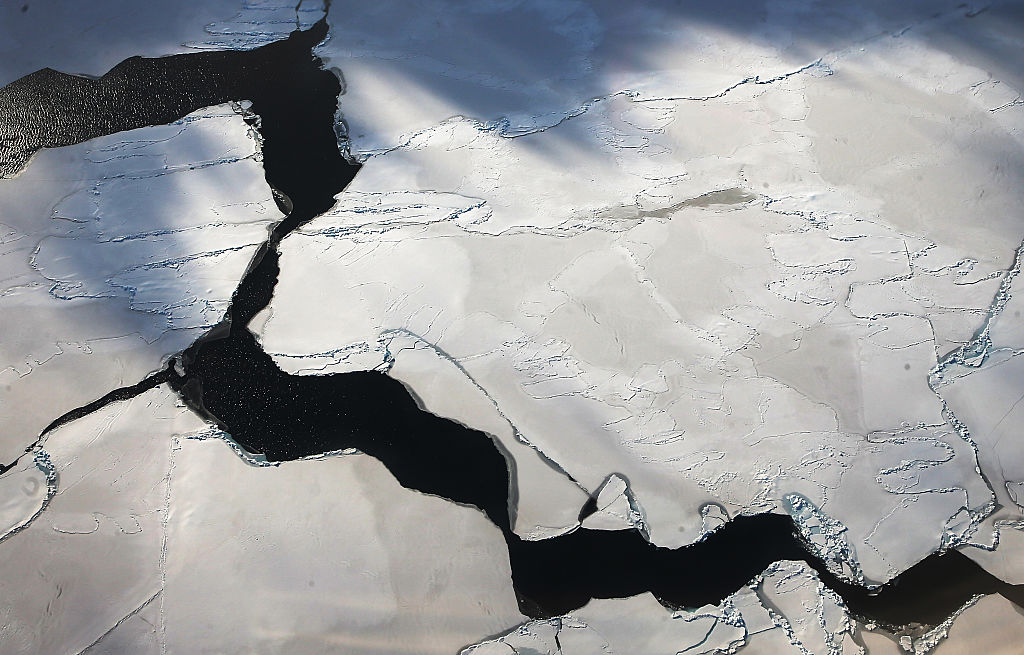Scientists can't explain why a giant hole the size of Maine just opened up in Antarctica


A mysterious hole the size of Maine has opened up in Antarctica, stumping scientists who have no clue how it formed, Motherboard reports. "It looks like you just punched a hole in the ice," explained University of Toronto Mississauga professor Kent Moore.
Called a "polynya" — an area of open ocean water in the midst of ice — the spot was first observed in the same location in the 1970s, but scientists at the time were limited in their ability to study it. "At that time, the scientific community had just launched the first satellites that provided images of the sea-ice cover from space. On-site measurements in the Southern Ocean still require enormous efforts, so they are quite limited," Dr. Torge Martin told Phys.org.
Last year, the hole mysteriously opened up again for a few weeks. The 2017 polynya, which is larger than the Netherlands and opened in early September, marks "the second year in a row it's opened after 40 years of not being there," Moore said.
The Week
Escape your echo chamber. Get the facts behind the news, plus analysis from multiple perspectives.

Sign up for The Week's Free Newsletters
From our morning news briefing to a weekly Good News Newsletter, get the best of The Week delivered directly to your inbox.
From our morning news briefing to a weekly Good News Newsletter, get the best of The Week delivered directly to your inbox.
Blaming climate change is "premature," Moore cautioned, adding that his team is working to publish their research on why the hole has appeared again. That being said, Martin added: "For us this ice-free area is an important new data point which we can use to validate our climate models. Its occurrence after several decades also confirms our previous calculations." Read more about the polynya at Motherboard and Phys.org.
A free daily email with the biggest news stories of the day – and the best features from TheWeek.com
Jeva Lange was the executive editor at TheWeek.com. She formerly served as The Week's deputy editor and culture critic. She is also a contributor to Screen Slate, and her writing has appeared in The New York Daily News, The Awl, Vice, and Gothamist, among other publications. Jeva lives in New York City. Follow her on Twitter.
-
 Political cartoons for December 13
Political cartoons for December 13Cartoons Saturday's political cartoons include saving healthcare, the affordability crisis, and more
-
 Farage’s £9m windfall: will it smooth his path to power?
Farage’s £9m windfall: will it smooth his path to power?In Depth The record donation has come amidst rumours of collaboration with the Conservatives and allegations of racism in Farage's school days
-
 The issue dividing Israel: ultra-Orthodox draft dodgers
The issue dividing Israel: ultra-Orthodox draft dodgersIn the Spotlight A new bill has solidified the community’s ‘draft evasion’ stance, with this issue becoming the country’s ‘greatest internal security threat’
-
 Blue Origin launches Mars probes in NASA debut
Blue Origin launches Mars probes in NASA debutSpeed Read The New Glenn rocket is carrying small twin spacecraft toward Mars as part of NASA’s Escapade mission
-
 Dinosaurs were thriving before asteroid, study finds
Dinosaurs were thriving before asteroid, study findsSpeed Read The dinosaurs would not have gone extinct if not for the asteroid
-
 SpaceX breaks Starship losing streak in 10th test
SpaceX breaks Starship losing streak in 10th testspeed read The Starship rocket's test flight was largely successful, deploying eight dummy satellites during its hour in space
-
 Rabbits with 'horns' sighted across Colorado
Rabbits with 'horns' sighted across Coloradospeed read These creatures are infected with the 'mostly harmless' Shope papilloma virus
-
 Lithium shows promise in Alzheimer's study
Lithium shows promise in Alzheimer's studySpeed Read Potential new treatments could use small amounts of the common metal
-
 Scientists discover cause of massive sea star die-off
Scientists discover cause of massive sea star die-offSpeed Read A bacteria related to cholera has been found responsible for the deaths of more than 5 billion sea stars
-
 'Thriving' ecosystem found 30,000 feet undersea
'Thriving' ecosystem found 30,000 feet underseaSpeed Read Researchers discovered communities of creatures living in frigid, pitch-black waters under high pressure
-
 New York plans first nuclear plant in 36 years
New York plans first nuclear plant in 36 yearsSpeed Read The plant, to be constructed somewhere in upstate New York, will produce enough energy to power a million homes
